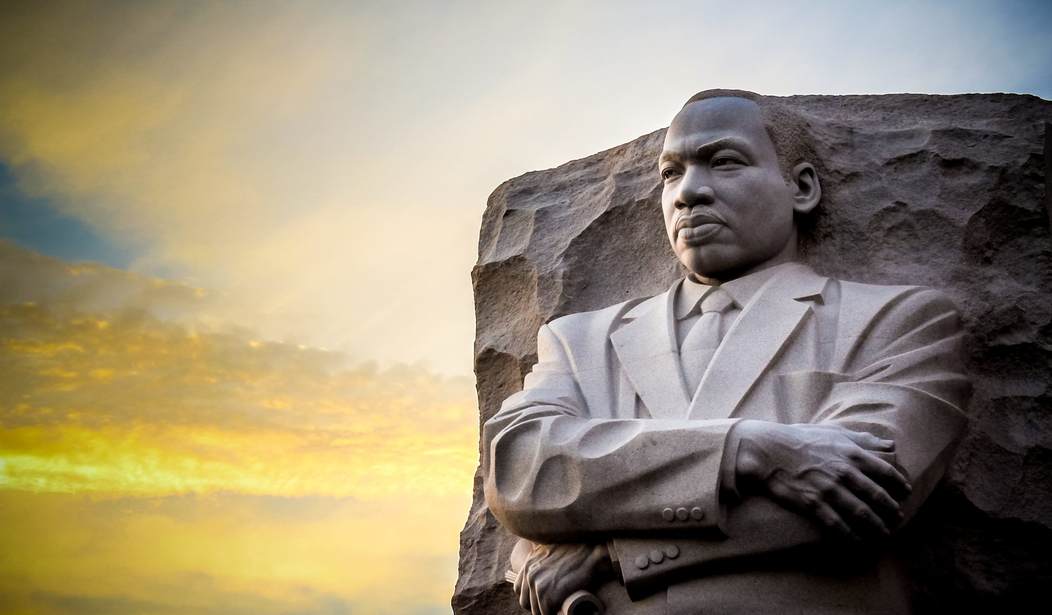“Black Lives Matter” protesters and their sympathizers suffer from delusions of grandeur, often comparing their “struggle” on the streets of modern cities to the protest movements of the past. One BLM supporter, Dan Thomas-Cummins, recently responded to my call for the prosecution of the movement’s organizers. He compared said organizers to Martin Luther King, Rosa Parks, Harriet Tubman, even Jesus Christ. He wrote:
Jesus was a criminal in his time and committed acts that violated the laws of the society under which he lived, all in the name of justice and salvation for the undesirable.
Oh, Jesus, you say? Well then. Case closed. Let’s dial things back a bit, shall we? Rather than scour history for anyone that committed an act of civil disobedience to immediately equate with BLM, let’s pause to consider a vital question. Is civil disobedience always moral? That’s the implication when citing any given dissident as BLM’s patron saint. Does it matter why Martin Luther King was protesting? Does it matter how he protested? Does the political and legal context of the time have any bearing upon our consideration? Or is belching a reference to MLK as far the conversation need go?
Among the many reasons why so many hold contempt for ‘Black Lives Matter’ is this professed moral equivalence between 1860, 1960, and today. BLM supporters act as if nothing has changed, as if they are the modern abolition movement or MLK reborn. The average Joe bristles, knowing that no injustice of today comes close to past sins. Take the Woolworth’s lunch counter sit-in, for example. BLM apologist Brian Peterfeso posted this on my Facebook page:
He asks of the Woolworth’s protesters, “Trespassing thugs — right, Walter Hudson?” That’s where I’m supposed to fold, kick the dirt, and confess that ‘Black Lives Matter’ is on the side of the angels. Except I can’t, because the comparison is inapt. Segregated lunch counters and other segregated public accommodations, did not result from private businessmen exercising property rights. Rather, such segregation was mandated under Jim Crow.
This is a crucial distinction. The objective of the lunch counter sit-in was to protest government. Sitting at those counters violated Jim Crow laws, not the rights of property owners.* There were no victims. Black money spent just as well as white. From this we may derive a principle: civil disobedience is just only when the law you break is unjust. You can’t simply trespass, then declare yourself in the same category as Martin Luther King. Putting yourself on a cross doesn’t make you Jesus Christ.
In contrast with the lunch counter sit-ins of 1960, “Black Lives Matter” violates the expressed will of property owners and disrupts the use of public infrastructure, victimizing innocents in protest of… what? Police brutality? Even granting the full benefit of the doubt on that complaint, police brutality is no Jim Crow. It certainly isn’t slavery. Breaking trespass laws to protest police brutality doesn’t resonate as well as breaking Jim Crow laws to protest Jim Crow. There’s also much to contrast between the rhetoric of someone like Martin Luther King and the rhetoric of “Black Lives Matter.” I’ll give you two quotes. You tell me which belongs to whom:
A) … the aftermath of violence is bitterness. The aftermath of nonviolence is reconciliation and the creation of a beloved community. A boycott is never an end within itself. It is merely a means to awaken a sense of shame within the oppressor but the end is reconciliation, the end is redemption.
B) Pigs in a blanket. Fry ’em like bacon!
Take your time. I’ll wait for your answer. Martin Luther King dreamed of a world where his children would be judged “not by the color of their skin, but by the content of their character.” We see skin color at a glance. We see character over time, displayed through a person’s actions and expressed values. The two are connected. Mimicking the actions of a moral man does not make you a moral man. Those actions have to proceed from sound values and take place in an appropriate context. One cannot credibly protest injustice by acting unjustly.
A movement earns moral credibility by resting both its ends and its means on just principles. MLK did that. BLM has not.
____________










Join the conversation as a VIP Member